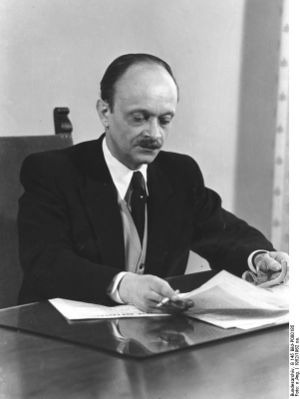Felix von Eckardt
(journalist, politician, deep state operative) | ||||||||||||
|---|---|---|---|---|---|---|---|---|---|---|---|---|
 | ||||||||||||
| Born | 18 June 1903 Berlin, Germany | |||||||||||
| Died | 11 May 1979 (Age 75) Capri, Italy | |||||||||||
| Nationality | German | |||||||||||
Important aide to Chancellor Konrad Adenauer
| ||||||||||||
Felix Heinrich Fedor von Eckardt was a German journalist, screenwriter and politician for the CDU. During the time of National Socialism he worked on a number of regime-friendly films. After the war he became Chancellor Konrad Adenauer's “eye, ear and mouthpiece”, with a strict anti-communist attidude.
Contents
Early Life
He was the son of the journalist Felix von Eckardt (* July 12, 1866 in Riga; † June 5, 1936 in Hamburg) and his wife Eva Maria Victoria née Geffcken, a daughter of Friedrich Heinrich Geffcken. Von Eckardt's grandfather was Consul General Julius von Eckardt, married to Isabella David, daughter of the Leipzig concertmaster Ferdinand David.
Felix Heinrich Fedor von Eckardt grew up in Hamburg. After attending secondary school, he attended the Prussian Cadet Institute at Berlin-Lichterfelde from 1916 to 1918, where he was to be prepared for a military career. Instead, he completed a banking apprenticeship after the First World War. Then he trained as a journalist at the Stuttgarter Tageblatt, from 1922 worked for his father's Hamburg newspaper, and from 1926 for the Münchner Neusten Nachrichten. In 1927 he was a foreign policy reporter at Ullstein Verlag, then from 1928 to 1929 worked as a foreign correspondent for the new Berlin daily Tempo. From 1929 to 1932 he worked as a press attaché at the news agency Wolff'schen Telegraphen Bureau in Brussels. He then wrote reports and feature articles for various publishers.
In the Movie business
Thanks to his friend, director Fritz Wendhausen, von Eckardt entered the film business in 1936. He mainly wrote scripts for revue films and crime films, but also some more propagandistic films. In 1937 he was earning well enough to buy a 100-acre estate near Neustrelitz.[1] Reich Propaganda Minister Joseph Goebbels liked his work, and he was exempted from the army in World War 2 because of his screenwriting work.[2]
Newspaper maker in Bremen
After the war, von Eckardt fled his East German estate to Bremen in 1945. He was toying with the position of editor-in-chief at the Weser-Kurier; However, since the Americans refused to grant him his publishing license due to his recent past, he initially had to be content with heading the politics department.[3] Instead, the SPD-member Hans Hack Mack received the license. Günther Schwarberg, who was volunteering at the Bremer Blatt at the time, wrote about von Eckardt: “He sets the tone for the newspaper. He writes the editorials and the commentaries." [4]
His texts were in line with the trivialization of German fascism and were all about the looming Cold War. In 1947, Eckardt was also granted the license, which enabled him to become a co-owner of the flourishing Weser Courier.
In addition, he was state chairman of the Europa-Union, which had many early Bilderbergers, in Bremen until May 1952.
Federal Press Chief and State Secretary
In 1952 Eckardt was asked to set up a press and information office for the federal government in Bonn. He was effectively a government spokesman. From May 1955 to 1956 he acted as an observer at the United Nations in New York. Eckardt, who as a confidant of Chancellor Konrad Adenauer, accompanied him on his trip to Moscow in September 1955. In July 1956 he was government spokesman again; In 1958 he rose to become a civil servant, State Secretary in the Federal Chancellery. He held this office until 1962. From July 1962 to October 1965 he was the representative of the Federal Republic in Berlin. From 1965 to 1972 von Eckardt was a member of the German Bundestag . He had won a direct mandate for the Christian Democratic Union (CDU) in the constituency of Wilhelmshaven.
On February 8, 1962, State Secretary von Eckardt protected Reichswehr Major Waldemar Pabst, who had ordered the murder of Rosa Luxemburg and Karl Liebknecht in 1918 and now, forty years later, was an arms dealer in Düsseldorf. Eckardt wrote in the Bulletin of the Federal Government: "Pabst does not deny its responsibility for the summary executions, but he assures that he had done it in greatest need and in the conviction that the only way to end the civil war and to save Germany from Communism."[5] Pabst was never prosecuted.
Event Participated in
| Event | Start | End | Location(s) | Description |
|---|---|---|---|---|
| Bilderberg/1962 | 18 May 1962 | 20 May 1962 | Sweden Saltsjöbaden | The 11th Bilderberg meeting and the first one in Sweden. |
References
- ↑ http://www.spiegel.de/spiegel/print/d-41120399.html
- ↑ Günther Schwarberg: Das vergess ich nie. Erinnerungen aus einem Reporterleben, Göttingen 2007, Seite 157
- ↑ Günther Schwarberg: Das vergess ich nie. Erinnerungen aus einem Reporterleben. Steidl Verlag, Göttingen 2007. page 100-101
- ↑ Günther Schwarberg: Das vergess ich nie. Erinnerungen aus einem Reporterleben. Steidl Verlag, Göttingen 2007. page 157
- ↑ Günther Schwarberg: Das vergess ich nie. Erinnerungen aus einem Reporterleben. Steidl Verlag, Göttingen 2007. page 159